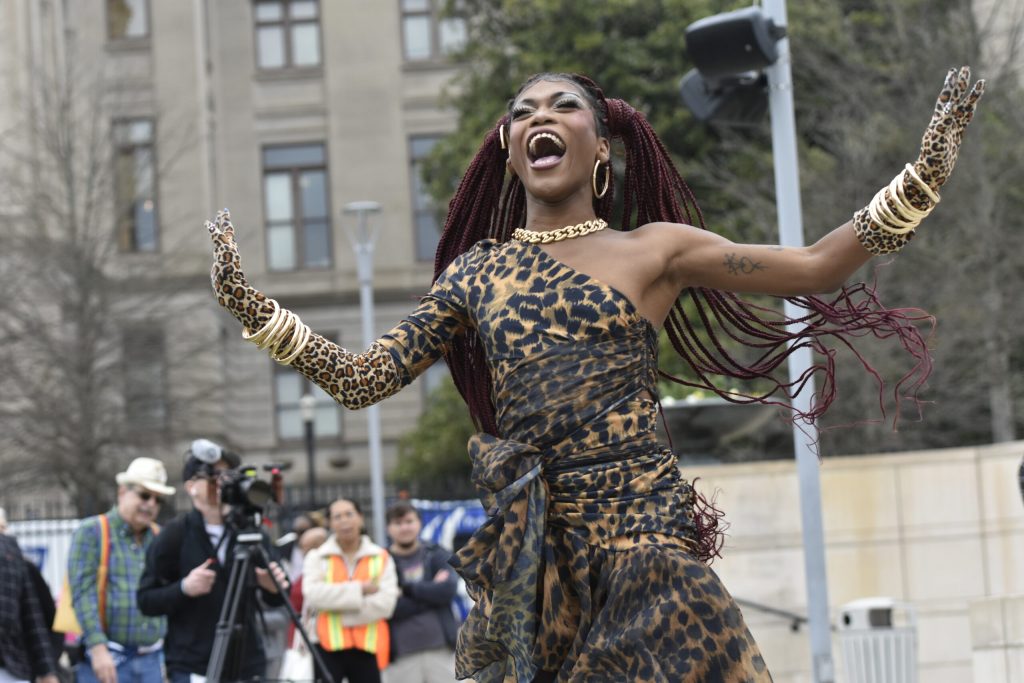‘Anti-LGBTQ’ bills stalled in the Georgia Legisature this time despite election year politics

Drag artist Miss He performs outside the Georgia Capitol as part of a pro-LGBTQ rally during the 2024 Legislative session. Ross Williams/Georgia Recorder
As Senators and House reps worked into the wee hours Friday morning, some LGBTQ advocates partied in the Capitol hallways outside the House and Senate chambers with hugs and cheers.
They were celebrating not because a bill squeaked by in the final minutes of the 2024 Legislative session, but because there were no squeakers.
Gay Georgians and their allies said they are used to playing defense when lawmakers come to Atlanta, but advocates like Human Rights Campaign Georgia State Director Bentley Hudgins said the rainbow side pulled off a flawless victory, defeating all of the more than 20 bills they described as anti-LGBTQ.
“MAGA politicians in Georgia tried it all in service to their anti-LGBTQ+ agenda, including silencing debate and gutting unrelated, popular bills that had bipartisan support to ram through policies that would have put young LGBTQ+ Georgians in harm’s way. They failed,” Hudgins said. “Everyday Georgians heroically showed up, over and over again, to demand that our lawmakers get back to the business of solving real problems. We showed up to reject the failing anti-LGBTQ+ agenda.”
Two years ago, trans Georgians and their families were not cheering the day after the Sine Die adjournment of the legislative session.
That year, just when it seemed like a bill aimed at preventing transgender girls from playing school sports would stall in the Legislature, Gov. Brian Kemp reiterated his support for the measure in his annual speech to the chambers, and shortly afterwards, GOP lawmakers slipped language with that goal into another bill.
Georgia Equality executive director Jeff Graham said the difference reflects a change in the political waters.
“It’s undeniable that the tides are shifting, both here in Georgia and across the nation,” he said. “Anti-LGBTQ actors are losing their political power, and more and more Georgians who know and love LGBTQ people are standing up against their baseless fear-mongering.”
The Human Rights Campaign reports similar defeats for bills in states including Florida and West Virginia.
Graham and others decried a pair of this year’s proposals in Georgia they said were especially sneaky, one banning puberty blocking medication for transgender minors attached to a student suicide prevention bill and one focusing on student sports participation and bathroom usage.
“This session, every bill targeting LGBTQ Georgians failed, even in the face of underhanded, anti-democratic political maneuvers that were desperately employed over the last few weeks. Advocates, medical experts, faith leaders, teachers and families all across Georgia came together to successfully defeat every last one – countering misinformation and standing up for every Georgian’s right to live their life freely, without government overreach and personal attacks.”
Other bills left on the legislative scrap pile include the latest iteration of the Religious Freedom Restoration Act, which supporters say would protect religious minorities but LGBTQ advocates say would create a license to discriminate. Lawmakers proposed bills that would seek to make it more difficult for children to access books with gay themes in libraries, to penalize drag performances and restrict teachers’ ability to talk about gender issues to their students.
Most of the bills came from the Senate side. In remarks to reporters Friday morning, House Speaker Jon Burns, a Newington Republican, implied that his chamber is more about getting stuff done than the Senate.
“You know, some folks choose politics, the House chooses results,” he said.
It’s also the case that the House has several Republican members with primary challengers ahead of the May 21 primary election.
“For most of Georgia’s legislative districts, they are drawn to not be swing districts. So typically speaking, the primary is the general election for the most part,” said Kennesaw State University professor of political science and former Cobb County Republican Party Chair Jason Shepherd.
Elected Republicans in safe districts don’t have much reason not to support the red meat social issues that their base wants.
“For a lot of these hot button issues, I think a Republican legislator who is in a very strongly conservative district will, if the bill passed and they voted for it, that will be a point in their column for reelection,” he said. “Or if it didn’t pass and they voted for it and it’s something that their Republican voters in their district wanted, they can use it as a case of ‘send me back and I’ll keep fighting for this.’”
Without a big gubernatorial or U.S. Senate race, Georgians can expect the primary to be relatively quiet, at least compared to 2020 or 2022, Shepherd said.
“We will need it going into November, which will be anything but quiet and peaceful,” he added. “Especially for Georgians, who are not used to a lot of presidential ads, if you think about it. Even in 2016, Clinton and Trump did not run a lot of ads in Georgia. So really, 2020 was the first time that we were bombarded as a swing state with heavy ad buys from both parties in the presidential race, and coupled with the fact that we had two Senate seats up. But at the very least, at this point, while we have the president, we won’t be, we won’t have to worry about ads for U.S. Senate or other statewide ads.”
SUPPORT NEWS YOU TRUST.
The post ‘Anti-LGBTQ’ bills stalled in the Georgia Legisature this time despite election year politics appeared first on Georgia Recorder.



